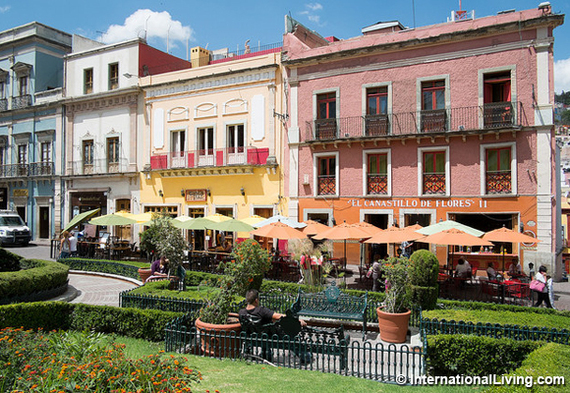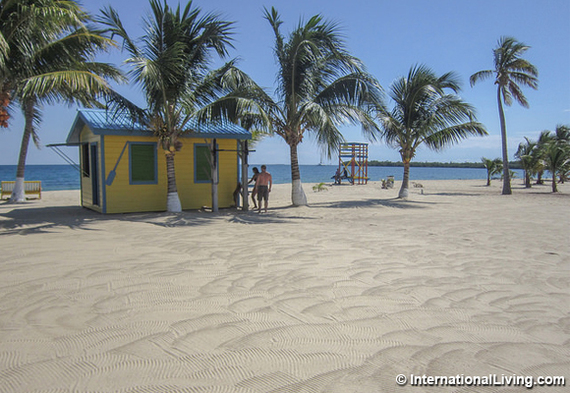If you're thinking about retiring overseas, but you're worried about how you'll navigate your financial world, don't be. It's not as difficult as you may think. The internet has made once-complicated money-management functions very easy. 
Colorful Buildings in Guanajuato, Mexico
The best advice is this: Before you ever leave home, take stock of your financial world as it exists now and consider what your needs will be in your new overseas home.
Here are some of those considerations:
1. Assess Your Current Bank and the Services and Fees it Offers
You'll need to keep an account back home in order to pay credit card bills and other financial obligations you may have. If you haven't already, make the switch now to full online banking and use the online system enough to be completely comfortable with it before you make the move overseas. This way, if you have any problems you can go into your bank in person and work them out. And make sure you also switch to paperless online delivery of your account statements.
There may be a good reason to maintain an account at a bank you've done business with for many years, especially if there is a manager who knows you personally ... someone you can call from overseas if you ever have an issue.
You may decide, though, that now is the time to start fresh and open a new account. This can be especially important if you won't have an account overseas but will be relying on ATM/debit card withdrawals to pay your expenses. In that case, look for a bank that doesn't charge foreign ATM fees.
2. Take Stock of the Credit Cards You Carry
Similar to your ATM cards, you'll want credit cards that don't charge any foreign currency exchange fees. And keep in mind that even though you can opt to get all your statements online, your credit card company will require that you have a mailing address in the U.S. or Canada.
Make sure to read all the fine print so you understand the services your credit cards provide. Some will cover basic rental car insurance overseas, for example, and some allow cash withdrawals -- be sure you know your associated PINs.
3. Decide How You Want to Receive Your Social Security Benefits
According to the U.S. Social Security website, nearly 650,000 Social Security payments are made each month to beneficiaries living in 203 foreign countries. If you're curious, the largest percentage of these -- more than 20 percent -- are sent to Canada, followed by Japan, Mexico, Germany, the UK, Philippines, Italy, and Poland--giving you an idea of where many foreign workers in the U.S. in the past have hailed from.
The point is: You won't have any problems collecting your Social Security benefits just about anywhere in the world you might choose to live, especially including all the popular retirement destinations. (Same goes for Canadians, by the way.)
There are a couple of ways to manage your Social Security payments. The two most popular methods are to have your benefits deposited directly into a financial institution either in the U.S. or in your country of residence.
Be aware, though, that not all foreign banks can accept direct deposits of U.S. Social Security benefit checks, so if this is your preference, make sure to choose one that does.
Also keep in mind that if you have your funds direct-deposited to your foreign account, your foreign bank will likely convert that amount into the local currency. (In countries like Panama and Ecuador, where the official currency in the USD, this won't be an issue. And in a country such as Belize, where the local currency is pegged 2:1 to the U.S. dollar, the exchange rate will always be easy to calculate.)
If you prefer to keep some of your benefits money in dollars, an alternative is to have your Social Security deposited into your U.S. or Canadian account, and then make ATM withdrawals abroad or wire funds to your local foreign account as needed.
4. If You Open a Bank Account Overseas, Choose the Bank Carefully.
It can be useful to have a bank account in your new home country. Not only can it help you prove your financial solvency and help you qualify for a resident visa, but many banks these days offer convenient online bill-paying services and more.
It's best to select a bank with a branch in your neighborhood for easy access, and to establish a personal relationship with the bank manager as soon as possible. (Look for someone who speaks English if you don't speak the local language.) Banking is still a very personal thing in many countries outside of the U.S., and having a good relationship with your local banker can make everything so much easier.
It's also best to choose a bank that has been in business for many years and has a good credit rating. Ask if deposits are insured and to what amount. You can do an internet search to see what kind of feedback--good or bad--is reported about the bank. And be sure to ask about fees, minimum deposits and other requirements important to you, such as the availability of debit cards that work across multiple electronic networks.
5. If You Are a U.S. Citizen, Understand Your Reporting Requirements
Note that the U.S. government has created FBAR (Foreign Bank Account Report) and FATCA (Foreign Account Tax Compliance Act) reporting requirements for anyone who has a foreign bank account, corporation, or more. You can learn more about these with a quick internet search. These requirements may or may not affect you, but be sure you understand them.
6. File Your Tax Returns
And remember that no matter where you live -- or whether you're earning an income or not -- if you are a U.S. or Canadian citizen, you must file your annual tax return with your citizenship country...no escaping this. You can easily do this all online, but if you have considerable assets or are earning an income in your new country, you may want to consult with a tax professional who understands the expat world.
This article comes to us courtesy of InternationalLiving.com, the world's leading authority on how to live, work, invest, travel, and retire better overseas.
Village Beach in Placencia, Belize
Related Articles
The Best Towns and Cities in South America Where You Can Live On Your Social Security
Infographic--Your Social Security Payments Overseas
Retire Close To Home in Low-Cost Mexico and Central America
Earlier on Huff/Post50:
